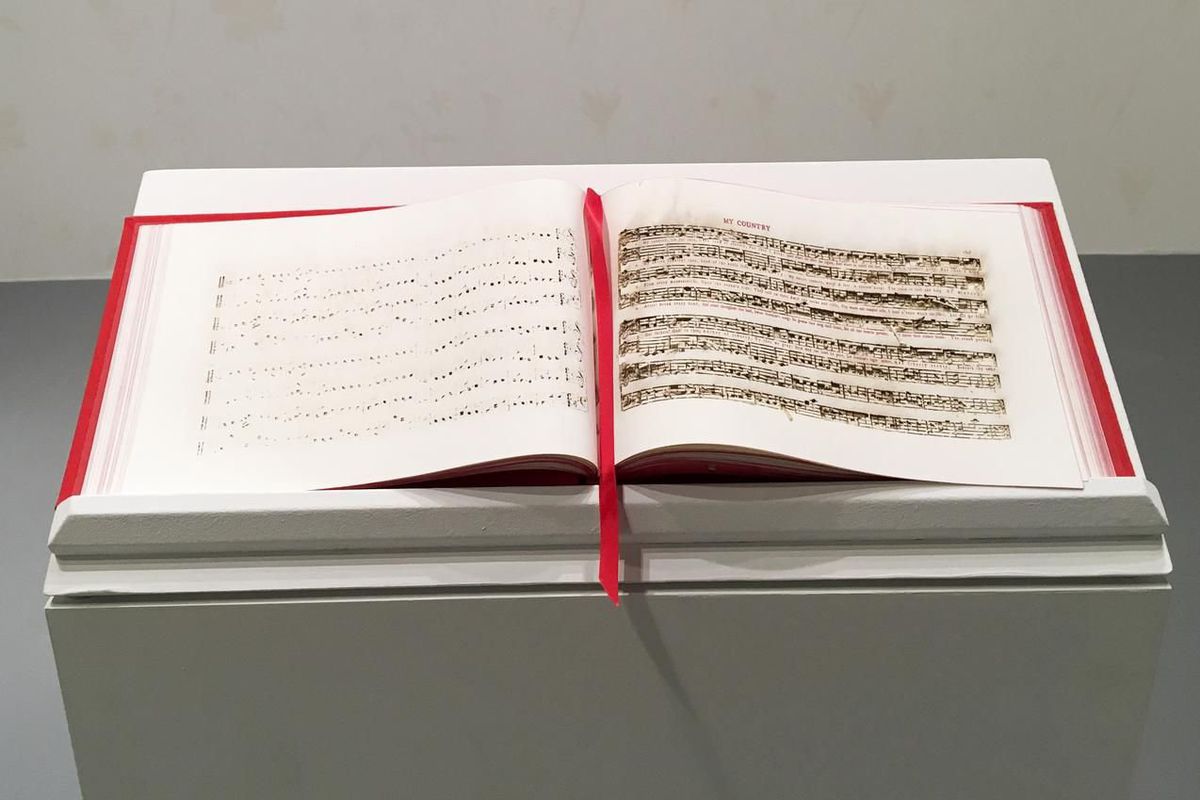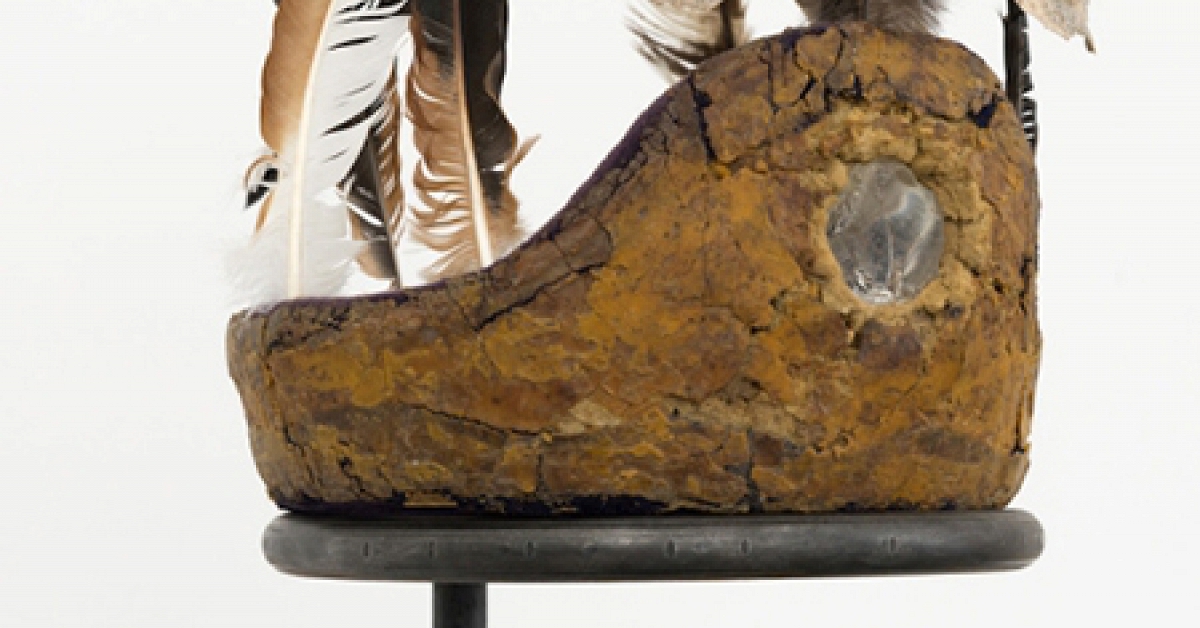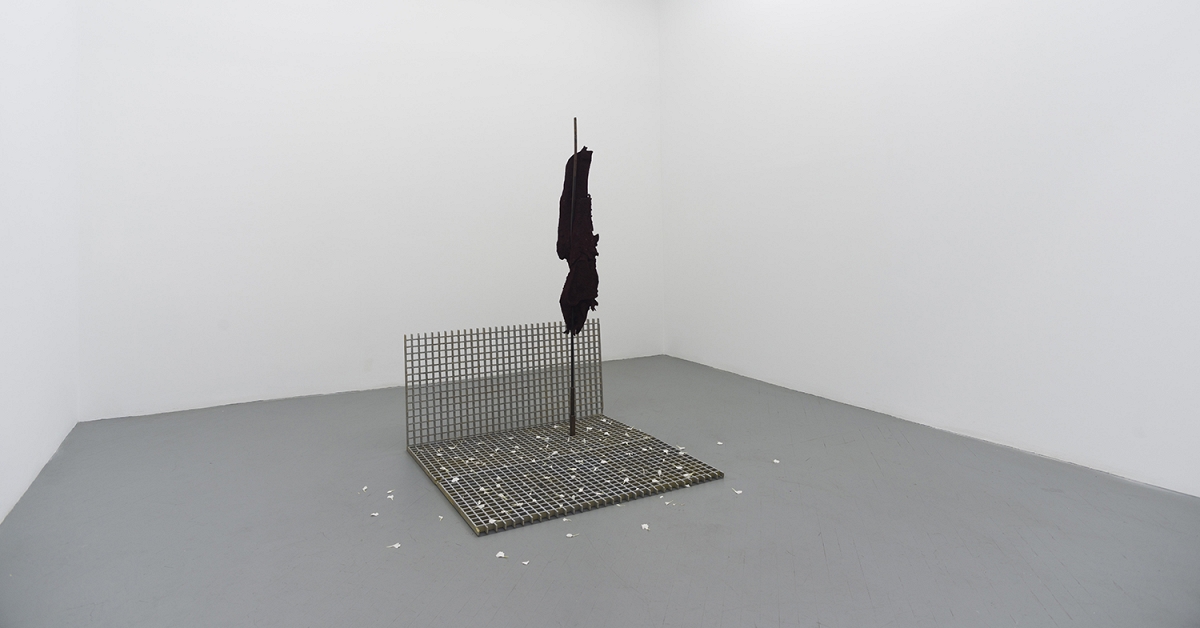At Miami’s Art Fairs, a Somber Mood Sets In
The Wall Street Journal / Dec 1, 2018 / by Kelly Crow / Go to Original
Art Basel Miami Beach is sobering up.
When the latest edition of the U.S.’s preeminent contemporary-art fair opens to the public on Thursday, it will be anchored by artworks tackling contentious issues like immigration, race and sexual violence.
It is a departure from the event’s typically breezy, partying tone, but reflects artists’ growing urge to respond to everything from the #MeToo movement to political divisions, dealers and organizers said.
Within the main fair at the Miami Beach Convention Center, the New York gallery Venus Over Manhattan is planning to show the colorfully grotesque figures of Maryan, a Polish artist who survived the Holocaust but lost his family there. His paintings from the 1960s and ’70s are priced from $28,000 to $78,000.
In Tyler Rollins’s booth, artist Tiffany Chung is unveiling intricate, topographical maps she created to illustrate her investigation into places where refugees were forced to flee. Her works are priced $30,000 to $75,000.
Jeffrey Gibson, also living in New York, has developed an international reputation for beaded figures and paintings on rawhide that reference his Choctaw heritage. Yet over the past year, he said he felt a greater need to create art that explores his identity as a gay man.
“For the first time, I’ve felt threatened,” he said, “so a lot of my work now is about questioning my own stability.”
Mr. Gibson’s works on offer in Roberts Projects’s booth include abstract paintings with cryptically dour titles like “Both Ends Burning” and “Love Will Tear Us Apart.” (Mr. Gibson’s paintings are priced from $24,000 to $50,000.)
The solemn atmosphere appears to extend to the smaller, satellite fairs like Pulse, where Detroit artist Ann Lewis will use twine and clothespins to suspend women’s underwear—some smeared with dirt, beer, glass and tears—for an installation, “One in Five of Us,” that nods to a statistic that 20% of U.S. women will be raped in their lifetimes. (The installation is about $18,000, the artist said.)
Politically charged works can be spotted in virtually any art fair. But the shift is notable at Art Basel Miami Beach because it and its satellite events are considered the flashy finale to the fall art season, accompanied by parties sponsored by vodka brands and hosted by celebrities like Paris Hilton. Ms. Hilton will still be manning a turntable at a local nightclub on Friday, but the overall tenor appears to be more serious than in past editions, dealers said. The fairs run through Sunday.
From the Design District to South Beach, watch for artists planning intense projects and performances.

At Miami’s nonprofit Locust Projects, Chicago-based artist Bethany Collins is enlisting choral groups on Thursday to sing 100 differing versions of the 1831 song, “My Country, ‘Tis of Thee,” including politically charged lyrical alterations.
Ms. Collins has also created a chapel-like space featuring a hymnal whose musical notation has been singed away. What’s left are charred pages “that will fall apart as people flip through it,” she said.
The recent fires in California will get a mournful nod during the concurrent Faena Festival. Miami artist George Sánchez-Calderón is erecting the four-walled facade of a Levittown suburban house on the beach outside the Faena Hotel—but on Tuesday, he plans to set it on fire as a symbol of displacement, festival organizers said.
Even some pieces that look playful contain layered meanings. Tschabalala Self, a New York artist currently doing a residency at the Studio Museum of Harlem, is planning to transform Thierry Goldberg’s booth into a makeshift bodega.
Her portraits of customers and products will hang beneath a convex mirror intended to evoke low-tech security measures, and the booth floor will be covered in colorful, vinyl tiles. Oversize milk crates will double as seating.
Ms. Self said she agreed to make several new pieces from her “Bodega Run” series for the fair in part because she “liked the idea of taking a store to a fair,” she said. (Her pieces will be $10,000 to $60,000.)
Paintings created by artificial intelligence will also make their Miami debut at the satellite fair Scope. Ahmed Elgammal, director of the Art and Artificial Intelligence Laboratory at Rutgers University, oversees AICAN, a machine that he has “fed” more than 100,000 art-historical images. It responds by creating new works, without copying any particular piece in its database.
The dozen results heading to Scope are “surreal,” Dr. Elgammal said, often resulting in portraits with distorted with facial features that will be priced from $16,000 to $25,000.
When the latest edition of the U.S.’s preeminent contemporary-art fair opens to the public on Thursday, it will be anchored by artworks tackling contentious issues like immigration, race and sexual violence.
It is a departure from the event’s typically breezy, partying tone, but reflects artists’ growing urge to respond to everything from the #MeToo movement to political divisions, dealers and organizers said.
Within the main fair at the Miami Beach Convention Center, the New York gallery Venus Over Manhattan is planning to show the colorfully grotesque figures of Maryan, a Polish artist who survived the Holocaust but lost his family there. His paintings from the 1960s and ’70s are priced from $28,000 to $78,000.
In Tyler Rollins’s booth, artist Tiffany Chung is unveiling intricate, topographical maps she created to illustrate her investigation into places where refugees were forced to flee. Her works are priced $30,000 to $75,000.
Jeffrey Gibson, also living in New York, has developed an international reputation for beaded figures and paintings on rawhide that reference his Choctaw heritage. Yet over the past year, he said he felt a greater need to create art that explores his identity as a gay man.
“For the first time, I’ve felt threatened,” he said, “so a lot of my work now is about questioning my own stability.”
Mr. Gibson’s works on offer in Roberts Projects’s booth include abstract paintings with cryptically dour titles like “Both Ends Burning” and “Love Will Tear Us Apart.” (Mr. Gibson’s paintings are priced from $24,000 to $50,000.)
The solemn atmosphere appears to extend to the smaller, satellite fairs like Pulse, where Detroit artist Ann Lewis will use twine and clothespins to suspend women’s underwear—some smeared with dirt, beer, glass and tears—for an installation, “One in Five of Us,” that nods to a statistic that 20% of U.S. women will be raped in their lifetimes. (The installation is about $18,000, the artist said.)
Politically charged works can be spotted in virtually any art fair. But the shift is notable at Art Basel Miami Beach because it and its satellite events are considered the flashy finale to the fall art season, accompanied by parties sponsored by vodka brands and hosted by celebrities like Paris Hilton. Ms. Hilton will still be manning a turntable at a local nightclub on Friday, but the overall tenor appears to be more serious than in past editions, dealers said. The fairs run through Sunday.
From the Design District to South Beach, watch for artists planning intense projects and performances.

At Miami’s nonprofit Locust Projects, Chicago-based artist Bethany Collins is enlisting choral groups on Thursday to sing 100 differing versions of the 1831 song, “My Country, ‘Tis of Thee,” including politically charged lyrical alterations.
Ms. Collins has also created a chapel-like space featuring a hymnal whose musical notation has been singed away. What’s left are charred pages “that will fall apart as people flip through it,” she said.
The recent fires in California will get a mournful nod during the concurrent Faena Festival. Miami artist George Sánchez-Calderón is erecting the four-walled facade of a Levittown suburban house on the beach outside the Faena Hotel—but on Tuesday, he plans to set it on fire as a symbol of displacement, festival organizers said.
Even some pieces that look playful contain layered meanings. Tschabalala Self, a New York artist currently doing a residency at the Studio Museum of Harlem, is planning to transform Thierry Goldberg’s booth into a makeshift bodega.
Her portraits of customers and products will hang beneath a convex mirror intended to evoke low-tech security measures, and the booth floor will be covered in colorful, vinyl tiles. Oversize milk crates will double as seating.
Ms. Self said she agreed to make several new pieces from her “Bodega Run” series for the fair in part because she “liked the idea of taking a store to a fair,” she said. (Her pieces will be $10,000 to $60,000.)
Paintings created by artificial intelligence will also make their Miami debut at the satellite fair Scope. Ahmed Elgammal, director of the Art and Artificial Intelligence Laboratory at Rutgers University, oversees AICAN, a machine that he has “fed” more than 100,000 art-historical images. It responds by creating new works, without copying any particular piece in its database.
The dozen results heading to Scope are “surreal,” Dr. Elgammal said, often resulting in portraits with distorted with facial features that will be priced from $16,000 to $25,000.






